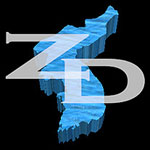
|
zandd.com: Time seems to run by at a quicker pace with each passing day. Every sunset marks one less day we have in our lives to live. Forgive me for the melodrama; this ambassador tends to get in a reflective mood when the seasons change. I know 21 is not such an advanced age to be, but as my college years draw to a close, I find myself evaluating and questioning the things I have done to this point. The blank pages of my life are no longer as empty, but now appear to be quite cluttered. Once again, thanks to those who responded to my article last month.
The very words "Korean-American" and "Asian-American" embody so much more than those two simple words can hint at. The hyphen is a bridge between two unique worlds, a bridge I am not sure even exists. The hyphen represents us. Are we pulling the two sides together, or are the two parts tearing us apart? East meets West. In my case, I'm not even sure which word should come first. Am I a "Korean-American" or an "American-Korean?" Sure there were times in my life when I thought I was an oppressed Korean kid in a white world, and other times when I felt more endeared to my American traits. Each passing phase has helped me attain a better understanding of the word "Korean-American." Now all that is left are some Korean CDs I don't listen to anymore and unanswered remnants to the ultimate question we all have to ask ourselves: Who am I? As Asian-Americans our identity crisis lasts way beyond puberty. People offer other labels like "1.5 Generation," "twinkie," and "fob." What does it all mean? A lot of times I find myself thinking that I am somehow utterly unique and totally different from anyone else on the planet, but I think that notion of individuality is a bit flawed. The notion of originality itself is nothing more than a fad. When we are all striving to be different, is that anything more than conformity? In reality, although none of us are exactly alike, we are a lot more similar than we would like to believe. Our thought processes and experiences will all be along the encompassing template of life. We try so hard to be profound when billions before us have already tread the ground we are covering. Don't all of our hearts pump blood? Is there anyone among us who will not bleed or feel pain? We are citizens of humanity, and a lot of times we lose focus of that. If you are unwilling to accept the notion that as human beings we are bound to one another, it is a fact that we always identify with some group or another. In particular "Korean-American" is a tricky category. There is no explicit recipe to being a Korean-American. In high school I used to think there was: a pair of JNCOs, Doc Martens, and a Korean flag on my wall. In retrospect, I can only laugh at my foolishness. Like with everything else in life, some sort of balance between the two parts is ideal. I constantly see both extremes. There are Koreans who refuse to learn English and integrate into society. There are also Koreans who completely fail to acknowledge their heritage and background. Both sides don't quite have the picture all together. The concept of knowledge is rather ironic. The more you know the better off you are, right? Then why is it that the more knowledge we attain, we in turn realize how much more there is to know and how little we actually do know? As we delve deeper into who we truly are, we might come out more confused than ever before. Still, wouldn't you rather be closer to the truth? What did you think of this article? Click here to send feedback. |


